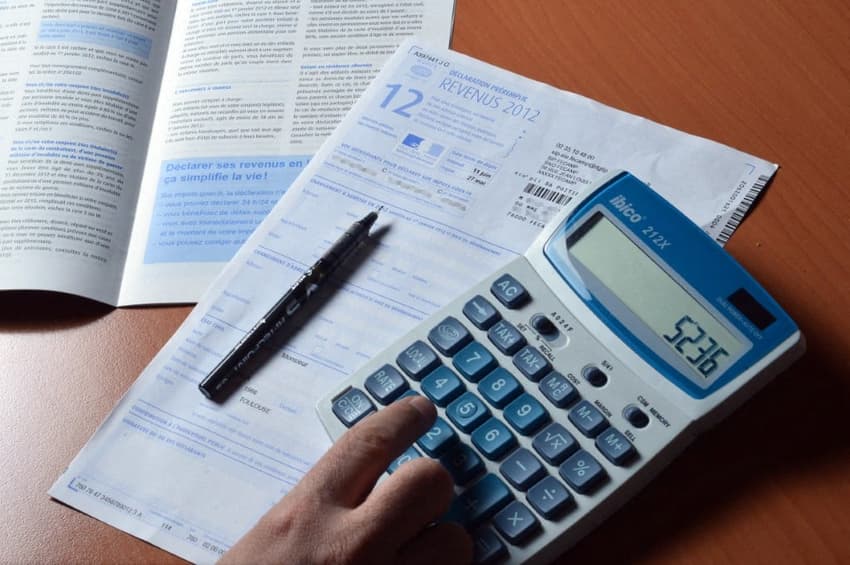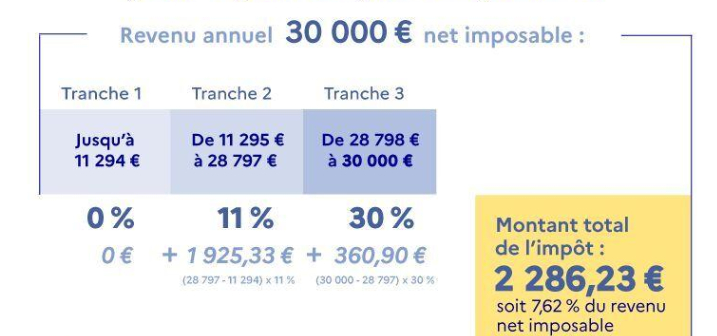How much tax can you expect to pay in France in 2024?

France is, famously, a high tax country - but exactly how much tax should you expect to pay in 2024? Here's a look at the latest income tax bands, plus other charges to be aware of.
When comparing taxation, France usually comes out among the top for the countries with the most highly taxed residents. That's not necessarily a bad thing - France spends its tax revenue on all sorts of cool things from an excellent public healthcare system to state-run railways and nice little perks like allowances for holidays, workplace training or concert tickets.
Bikes, gigs and holidays - 8 things the French government might pay for
But most people can expect to be paying a significant amount each year to the French tax office.
As the finance ministry reveals the new brackets for income tax in 2024, we take a look at how much you can expect to pay, plus the other taxes and charges to factor in.
Income tax
Obviously you will only pay this if you are earning money in France. In most cases this would be through working as either an employee or a freelancer/self-employed/contractor but it can also be charged on income such as that from renting your property.
If all your income comes from outside France you probably won't pay tax (depending on whether your country has a dual taxation agreement with France which most countries do) although you may pay social charges - more on them later.
However, even if you are not liable for any French income tax, you will still have to fill out the annual tax declaration if you are resident in France - more details here.
If you live outside of France you may still be liable for French taxes if you have income here - and that includes second-home owners who rent out their French property for part of the year.
The new income tax brackets for 2024 are;
- Up to €11,294 - 0
- Between €11,294 and €28,797 - 11 percent
- €28,797 to €82,342 - 30 percent
- €82,342 to €177,106 - 41 percent
- More than €177,106 - 45 percent.
Like most countries, French taxes are progressive so if you are a higher earner, you would only pay the 45 percent tax rate on the portion of your income that is over €177,106.
The French public service website offers this breakdown on an example of taxable income of €30,000 per year, showing a total annual income tax bill of €2,286.

If you are married or in a civil partnership you make a joint tax declaration with your partner. In this case your taxable income is calculated according to your quotient familiale - which is basically the total household income divided by the number of taxpayers in the household.
You can also test out this simulator from the French media Boursorama to get a general, non-detailed idea of how much you might owe in French income taxes.
Social charges
But if you're thinking that doesn't sound like a particularly big tax bill then slow down - there's still social charges to take into account.
Deductions in France are split into two categories - impôts (income tax) and prélèvements sociaux (social charges) - the latter encompasses things like pension contributions but also deductions to cover healthcare charges, unemployment benefits, sick leave or maternity leave. They're broadly similar to National Insurance contributions in the UK.
Exactly how much you are charged depends on your income and other factors such as your pension regime, but for most people the social charges will easily exceed the income tax deductions, often social charges are two or three times higher than income tax.
If you are an employee, your pay slip will give you a detailed breakdown on how much you are paying in social charges and how much in taxes, while if you are self employed the information is available via URSSAF.
READ ALSO How to understand your French payslip
The other important thing about social charges, is that you may be required to pay them on tax-free income - for example income from overseas such as a British or American pension.
Other taxes
There are also some other taxes that you may need to take into account, including capital gains tax, inheritance tax and property tax.
If you own property in France you will need to pay the annual taxe foncière, and if your property is a second home you will also have to pay taxe d'habitation. The amounts vary by area and according to the value of the property, but you can find a breakdown HERE.
If you have rented out your property - even just for a couple of weeks on Airbnb - you will need to pay tax on the rental income.
Good news for tenants, the householders' tax taxe d'habitation has now been abolished for everyone apart from second home owners, while the annual TV licence has also been scrapped. If you live in a small village you may also be charged an annual waste collection charge, although this is usually not a large amount.
If you have been the recipient of an inheritance you may need to pay inheritance tax, depending on your relationship with the legatee - full details here.
You may also be liable for capital gains tax on certain types of income in France, for example if you have sold a property - full details here.
And there is also a wealth tax (IFI) which can be applied to people with total assets worth more than €1.3 million. The general rule is that for the first five years of residency in France, the wealth tax considers only assets based in France, not abroad. However, once you enter six years of residency in France then your global assets will be considered.
Comments
See Also
When comparing taxation, France usually comes out among the top for the countries with the most highly taxed residents. That's not necessarily a bad thing - France spends its tax revenue on all sorts of cool things from an excellent public healthcare system to state-run railways and nice little perks like allowances for holidays, workplace training or concert tickets.
Bikes, gigs and holidays - 8 things the French government might pay for
But most people can expect to be paying a significant amount each year to the French tax office.
As the finance ministry reveals the new brackets for income tax in 2024, we take a look at how much you can expect to pay, plus the other taxes and charges to factor in.
Income tax
Obviously you will only pay this if you are earning money in France. In most cases this would be through working as either an employee or a freelancer/self-employed/contractor but it can also be charged on income such as that from renting your property.
If all your income comes from outside France you probably won't pay tax (depending on whether your country has a dual taxation agreement with France which most countries do) although you may pay social charges - more on them later.
However, even if you are not liable for any French income tax, you will still have to fill out the annual tax declaration if you are resident in France - more details here.
If you live outside of France you may still be liable for French taxes if you have income here - and that includes second-home owners who rent out their French property for part of the year.
The new income tax brackets for 2024 are;
- Up to €11,294 - 0
- Between €11,294 and €28,797 - 11 percent
- €28,797 to €82,342 - 30 percent
- €82,342 to €177,106 - 41 percent
- More than €177,106 - 45 percent.
Like most countries, French taxes are progressive so if you are a higher earner, you would only pay the 45 percent tax rate on the portion of your income that is over €177,106.
The French public service website offers this breakdown on an example of taxable income of €30,000 per year, showing a total annual income tax bill of €2,286.

If you are married or in a civil partnership you make a joint tax declaration with your partner. In this case your taxable income is calculated according to your quotient familiale - which is basically the total household income divided by the number of taxpayers in the household.
You can also test out this simulator from the French media Boursorama to get a general, non-detailed idea of how much you might owe in French income taxes.
Social charges
But if you're thinking that doesn't sound like a particularly big tax bill then slow down - there's still social charges to take into account.
Deductions in France are split into two categories - impôts (income tax) and prélèvements sociaux (social charges) - the latter encompasses things like pension contributions but also deductions to cover healthcare charges, unemployment benefits, sick leave or maternity leave. They're broadly similar to National Insurance contributions in the UK.
Exactly how much you are charged depends on your income and other factors such as your pension regime, but for most people the social charges will easily exceed the income tax deductions, often social charges are two or three times higher than income tax.
If you are an employee, your pay slip will give you a detailed breakdown on how much you are paying in social charges and how much in taxes, while if you are self employed the information is available via URSSAF.
READ ALSO How to understand your French payslip
The other important thing about social charges, is that you may be required to pay them on tax-free income - for example income from overseas such as a British or American pension.
Other taxes
There are also some other taxes that you may need to take into account, including capital gains tax, inheritance tax and property tax.
If you own property in France you will need to pay the annual taxe foncière, and if your property is a second home you will also have to pay taxe d'habitation. The amounts vary by area and according to the value of the property, but you can find a breakdown HERE.
If you have rented out your property - even just for a couple of weeks on Airbnb - you will need to pay tax on the rental income.
Good news for tenants, the householders' tax taxe d'habitation has now been abolished for everyone apart from second home owners, while the annual TV licence has also been scrapped. If you live in a small village you may also be charged an annual waste collection charge, although this is usually not a large amount.
If you have been the recipient of an inheritance you may need to pay inheritance tax, depending on your relationship with the legatee - full details here.
You may also be liable for capital gains tax on certain types of income in France, for example if you have sold a property - full details here.
And there is also a wealth tax (IFI) which can be applied to people with total assets worth more than €1.3 million. The general rule is that for the first five years of residency in France, the wealth tax considers only assets based in France, not abroad. However, once you enter six years of residency in France then your global assets will be considered.
Join the conversation in our comments section below. Share your own views and experience and if you have a question or suggestion for our journalists then email us at [email protected].
Please keep comments civil, constructive and on topic – and make sure to read our terms of use before getting involved.
Please log in here to leave a comment.